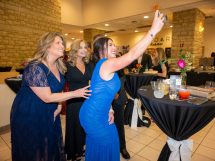By Kathie Stamps

is helping others in the meantime. Here he is participating in RunTheBluegrass Half Marathon.
On Sept. 13, 2016, Lisle Adams was on his way to work – he runs a Lexington wholesale company called Shuffle Bean Coffee – when he had a fender bender on a busy stretch of New Circle Road. He pulled over to check the damage. Then another driver had a seizure, drove off the road and pinned Adams between the two vehicles. The driver’s foot was still on the gas pedal.
People stopped, broke the driver’s window and stopped the vehicle, pulled Adams away and called an ambulance. The accomplished triathlete and distance runner was rushed to the University of Kentucky Chandler Hospital, where he stayed for 16 days. His injuries included extensive soft-tissue damage to his leg, a compound fracture of the femur and a shattered pelvis, necessitating 10 different surgeries in just under eight months.
After his hospital stay, he was bed-ridden for another two months. Being incapacitated for so long was difficult for someone so active. He swam for Transylvania University while majoring in accounting from 2005 to ’09, cross-trained during the summers with cycling, then took up running after college and wound up competing in 5K races, sprints, Olympic-distance triathlons, nine marathons and two half-Ironman competitions.
Adams, married to Chrissie Adams, had wanted to have an Ironman triathlon under his belt before he turned 30, so last year he registered for Ironman Maryland. It was set to take place on Oct. 1, six days before his 30th birthday.
On that Tuesday morning in September as he left for work, with his dream goal only two-and-a-half weeks and 600 miles away, Adams had no idea his life would change so drastically.
“I had 11 blood transfusions, and am still anticipating the eventual use of donor tendons to fix my ACL and PCL ligaments,” he said.
Through his “Titanium Man” blog he is chronicling his recovery and training schedule as he prepares for the Gift of Life 5K at College Park in Winchester, Ky., on Sept. 16.
“That’s the first race on my books,” he said. “That’s the first one I have scheduled for this comeback.”
The 5K benefits the Trust for Life program, created in 1992 by the Kentucky Association of Circuit Court Clerks, and Clark County’s Arthur Walson in particular. As circuit clerk, Walson had the idea for people to become organ donors via their drivers’ licenses. The plan was implemented and has become a national model for organ donor registries. In Clark County, 88.9 percent of the eligible population is on the registry as organ donors.
Paula Joslin, Walson’s niece and current Clark County Circuit Clerk, has known Adams all his life. She is friends with his mother, who is a retired circuit judge.
“The whole community was shocked by his accident and has followed his recovery,” said Joslin, who is also president of Trust for Life’s board of directors.
“I try to ensure all 120 counties are actively promoting Trust for Life and help new circuit clerks become familiar with the program,” she said.
Because of his receipt of blood and eventual tendons and his affiliation with his aunt, Clark County Deputy Clerk Charla Hylton, Adams – who calls himself a “proud Clark Countian” – was named the chairperson for the Gift of Life 5K.
“Every day when I wake up, I can make the decision to work to get better or sit here and stay the same and get worse,” he said. “I have so many people rooting for me. As long as you know you’ll get better you’ll get through.”
The next time you get your license renewed at a circuit clerk’s office, you can become a registered organ donor through the Trust for Life program. Every 10 minutes, someone is added to the nation’s organ transplant waiting list. One tissue donor can help 75 people. Visit trustforlife.org.




















Add Comment